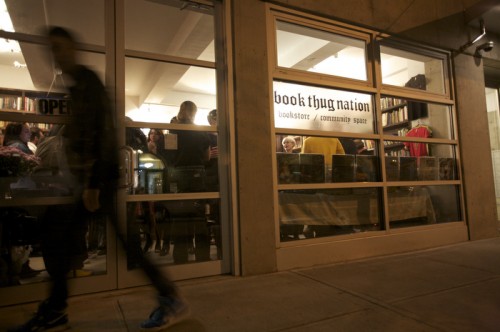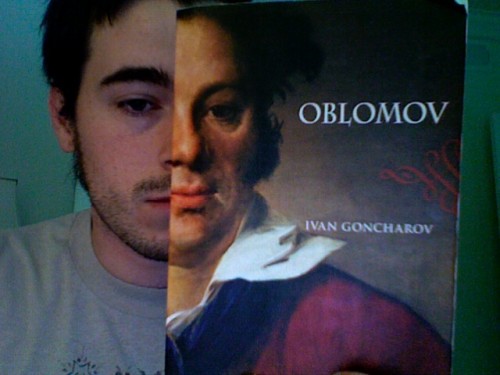Happy Birthday, Acid.
httpv://www.youtube.com/watch?v=n-rWnQphPdQ
Happy birthday, LSD. Thanks for all you done for us over the years.
httpv://www.youtube.com/watch?v=4fyxNPz9-ks
Books I Bought Last Week, Where I Bought Them, What They Cost

Last week was a big book-buying week for me. I don’t know why, exactly, but I just kept going for it. If anything, I think I was reminding myself how thoroughly lucky I am to live in a city where there are literally dozens of independent bookstores that I can go visit anytime I feel like it.
Bookthug Nation – a newly opened used bookstore on North 3rd street between Berry and Wythe, in Williamsburg. This place is really fantastic, and I’m thrilled that they exist. The space is super-intimate, the curation is stellar, there’s art on the wall by the guy who does Cometbus, and they hold events there. Books purchased: (1) A hardcover copy of The Ghost Writer by Philip Roth ($5). I already own this book as part of the Zuckerman Unbound quartet, but my copy of that book is falling to pieces, and I figure that GW is the one I’m most likely to re-read. (2) The Odyssey, translated by Robert Fitzgerald ($3). This is the best-known translation, and owning it feels sort of like owning a copy of the King James Bible–something you ought to have on-hand, irrespective of when (or whether) you actually read it. (3) Bawdy Verse: A Pleasant Collection ($4) edited by E.J. Burford. A sweet little anthology of dirty poems and songs from Old England. “The weather is cold and chilly / And heating will do thee no harm, / I’ll put a hot Thing in thy Belly / To keep thy body warm.” – “Mine Own Sweet Honey-bird-chuck,” ~1655. And so on.
A ‘life-changing’ book

Two weeks ago, after my class and I read Lydia Millet’s My Happy Life, we talked about how the book affected us. I asked them to describe how they felt immediately after they finished reading the book. I tried to explain to them that after I finished reading My Happy Life, I just sat in my house at my desk and stared at the wall and felt emotions, but as I felt the emotions, I had a hard time realizing which emotions I was feeling, as if the realization that I was feeling emotions was incompatible with the actual feeling of emotions. Does that make sense? Then I stopped talking and looked at my class and giggled.
Anyhow, some of the students also added their experiences to my own, and though I can’t remember all that was exactly said, I remember that what was often described was this sense that the book left the student both feeling happy and sad (this seemed to be an exciting part of the conversation because it required us to keep in mind sadness and happiness simultaneously), that the book had made the student think about the ‘details’ and ‘little things’ of his or her life (remember the narrator’s collection of tiny objects?), that no matter how shitty you think your life is…and so on.
Wish You Were There: Audio from the Agriculture Reader @ NYU Now Available Online
 On Friday, November 6, Jeremy Schmall and I hosted Jen Hyde, Heather Christle, Joshua Cohen, Diane Williams, and Matthew Rohrer at the Lillian Vernon Writers House at NYU, for a reading in celebration of AGR ’09. The audio of the reading is now available online here (.mp3). After you listen to our event, you should wander over to the Creative Writing Program’s podcast mainpage–it’s a real treasure trove. Charles Simic talking to Alice Quinn. Elaine Equi and Darin Strauss reading together. An evening with Wave Books (Joshua Beckman, Noelle Kocot, Chelsea Minnis–which I was in the audience for; try listen for my clapping). And so on and so forth.
On Friday, November 6, Jeremy Schmall and I hosted Jen Hyde, Heather Christle, Joshua Cohen, Diane Williams, and Matthew Rohrer at the Lillian Vernon Writers House at NYU, for a reading in celebration of AGR ’09. The audio of the reading is now available online here (.mp3). After you listen to our event, you should wander over to the Creative Writing Program’s podcast mainpage–it’s a real treasure trove. Charles Simic talking to Alice Quinn. Elaine Equi and Darin Strauss reading together. An evening with Wave Books (Joshua Beckman, Noelle Kocot, Chelsea Minnis–which I was in the audience for; try listen for my clapping). And so on and so forth.
Meet Penelope
 My friend just got a puppy.
My friend just got a puppy.
NaNoWriMo Tips from Mark Sample
 A little over a week has passed this NaNoWriMo, and though I am pretty much skeptical of the whole production, I have to say that I’m cracking up at some of the NaNoWriMo tips that Mark Sample sends out on his twitter feed. Follow him at samplereality (you’ll have to scroll through his feed to find his old ones) to get tips. Here’s a handful that I enjoyed:
A little over a week has passed this NaNoWriMo, and though I am pretty much skeptical of the whole production, I have to say that I’m cracking up at some of the NaNoWriMo tips that Mark Sample sends out on his twitter feed. Follow him at samplereality (you’ll have to scroll through his feed to find his old ones) to get tips. Here’s a handful that I enjoyed:
#NaNoWriMo Tip: Reenergize your writing by changing your workspace. Move out of your parents’ basement.
#NaNoWriMo Tip: Rehearse for your imminent book tour by showing up drunk at a Borders and telling everyone “I’m here to sign my books.”
#NaNoWriMo Tip: Add tension by making the gender of your narrator indeterminate. This works for race too. And age. And number of nipples.
#NaNoWriMo Tip: Writing about a brilliant professor who solves 1,000-year-old mysteries? This is for you. Why does my cat puke in my shoes?
#NaNoWriMo tip: “Write about what you know” is good advice, unless you’re OJ Simpson.
#NaNoWriMo Tip: RT @wshspeare Take advantage of the rich tradition of stealing other writers’ ideas and words when you run out of your own.
#NaNoWriMo tip: Use foreshadowing to hint what’s to come. E.g., have the vampire say “I want to suck your blood” before he sucks blood.
#NaNoWriMo tip: Novelists should dress for success just like everyone else. Failing that, novelists should at least dress.
Some YoYo Stuff: Beefheart
Beefheartian documentary on Captain Beefheart, also at Ubu:
This essay about the book Intermere in The Believer has me thinking about the old, weird Utopian novel. Like this one. Or some of the other books from Health Research Books. Question: do you readers have a favorite oddball Utopian book? Let’s hear about it.
What is an ‘essay’?

Over at the Brevity blog, we have this:
Brevity editor Dinty W. Moore is pleased to have published what he believes to be the shortest essay ever, in the new Mississippi Review.
Of Dinty Moore’s piece, Mike Scalise sincerely asks “can someone please explain to me, in sober, clear, and intelligent terms, what makes ‘I have a tendency towards glibness’ an ‘essay’?”
In the introduction to the issue, Jane Hamilton explains in postive/negative terms:
To the right of zero, we have “essay,” “hybrid” and “lyric”—positive terms, assertions of form in the absence of form. But as the works collected here demonstrate, these terms describe forays to the left side of the number line, attempts to fill in the lacunae of memory, find the truth in untruth or half-truth, to compensate for the limitations of language and labels. In these poetic non-poems and narrative non-stories, we can see what I’ve always suspected to be true—the real action is in front of zero.
What do you think, marmot?
(TOC here)
Starting at 5:41, genius appears.
httpv://www.youtube.com/watch?v=Ta2DePPtLo8
“It’s that easy to play guitar.”
This is one of the five funniest movies I’ve ever seen.
